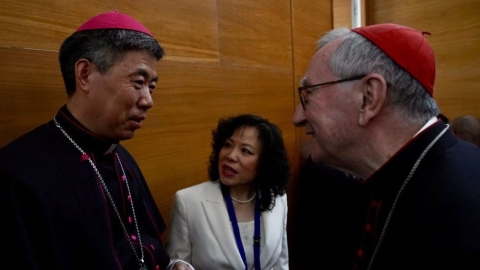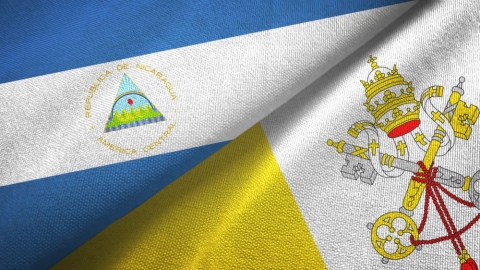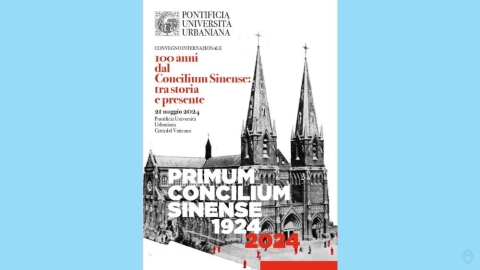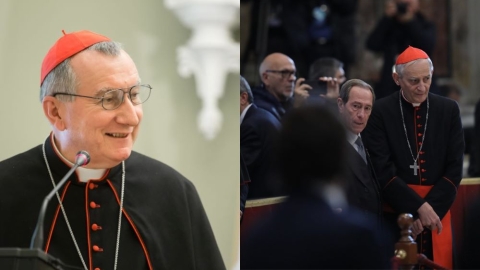Vatican: A Letter from Pope Francis Attacks the Synodal Path

On Tuesday, November 21, 2023, Die Welt published a missive from Pope Francis dated November 10, in response to a letter from four German Catholics sent to the Pope four days earlier. This papal letter employs fairly strong words against the German Synodal Path (also called the Synodal Way).
The Background
The four signatories of the letter to the Pope are not completely unknown. They distinguished themselves at the beginning of the year by dramatically withdrawing from the Synodal Path. The four women had been part of it as delegates since 2019, nominated by the German Bishops’ Conference (DBK).
In an open letter published in Die Welt on February 21, 2023, Hanna-Barbara Gerl-Falkovitz, Marianne Schlosser, Dorothea Schmidt, and Katharina Westerhorstmann explained the reasons for their departure. The first was the Synodal Path’s central questioning “of fundamental doctrines and beliefs.” Therefore, they could not “any more follow this route which separates the German Church more and more from the universal Church.”
Refusing to participate in the 5th Assembly, held from March 9 to 11, they again explained that to take part in a process “in which the interventions and clarifications repeated by the Vatican authorities and the Pope himself had been ignored” would mean, for them, assuming co-responsibility in the isolation of the Church in Germany from the universal Church.
As a third reason, they complained that “the serious arguments in favor of ecclesiastic doctrine currently in force were not taken into account.” They also contested the rejection of the request “for a secret vote during the last synodal assembly” and “the online publication of the results of the open vote.”
Finally, their last reason noted “that the last letter to Rome, dated January 16, 2023, signed by the Cardinal Secretary of State Pietro Parolin and Cardinals Luis Ladaria [Ferrer] and Marc Ouellet, had not yet been sent to the members of the synodal Assembly nor brought to their attention.”
The particularly serious aspect of this omission lies in the fact that this letter, “expressly approved by the Pope himself and thus legally binding,” concerned a central objective of the Synodal Path: the creation of synodal councils (at the national, diocesan, and parish levels), which the Synodal Path has no authority to establish.
Despite this, the agenda of the 5th Assembly had retained the institution of a Synodal Committee, “of which the stated goal is none other than the formation of a Synodal Council.” So the signatories asked themselves “if the assertions of the Synodal Path’s directorship that we will remain in the order of the universal Catholic Church and that we will respect canon law” were reliable.
The Participants in the Synodal Path Continue
Despite the warnings from Rome, the German bishops and their allies on the Central Committee of German Catholics (ZdK) followed their program and on November 10 founded the Synodal Committee anticipated by the last synodal Assembly in March 2023. This Committee will follow through on the measures voted on and will prepare the formation of the synodal councils denied by Rome.
It is in this context that the four women wrote to Pope Francis. The contents of their letter are not known but are discernable in reading the Pope’s response: it speaks of the concern of seeing the DBK and the ZdK advance unshakably toward the goal they gave themselves, without at all considering the remarks of Rome.
The site katholisch.de explains that the four authors do not wish to publish their letter to the Pope. On the other hand, however, Pope Francis gave his written consent for the publication of his response letter.
The Response of Pope Francis
Noticing the apprehension of his correspondents, the Supreme Pontiff confirmed that he shares “this worry concerning the numerous concrete measures taken in the meantime, by which the greater part of this local Church risks separating itself always further from the common path of the universal Church.”
This concerns “the establishment of the synodal committee” which “aims to set up a consultative and decision-making body. However, as outlined in the corresponding resolution, its proposed structure is not in alignment with the sacramental structure of the Catholic Church. Consequently, its formation was forbidden by the Holy See in a letter dated Jan. 16, 2023, which received my specific endorsement.” Such a prohibition would normally be definitive and without appeal.
The Pope continues that we must not search “to find ‘salvation’ in constantly evolving committees, nor to persist in self-absorbed dialogues rehashing the same themes,” but he instead invites us “to reemphasize the importance of prayer, penance, and adoration,” as well as to open ourselves “to engage with our brothers and sisters, especially those found at the thresholds of our church doors, in the streets, within prisons, hospitals, public squares, and cities,” referencing his previous Letter to the Pilgrim People of God in Germany.
What Comes After The Warning?
It will be nothing to the active members of the Synodal Path—the DBK as much as the ZdK. This letter does not address itself to them but to four people who have become strangers to them. It demands nothing; it only states a concern and reminds of a prohibition which has not, up to this point, brought any fruits in close to a year—all to the contrary.
Unfortunately, we must observe that Pope Francis’s mode of operation is always very political. He knows to say what certain people want to hear, all while maintaining his own standards. He must do much more to stop the train of events the Synodal Path is on. For that matter, does the Pope want to stop it? One might doubt it.
To take a concrete example, the blessing same-sex couples is officially practiced in Germany—with the approval of the local bishop in many places—and in Dutch-speaking Belgium, even with texts ratified by the bishops. And Bishop Johan Bonny of Antwerp asserted multiple times that he had referred to the Pope, who had not dissuaded him from it.
The response of Pope Francis to the second dubium of the five cardinals, on the question of the blessing of same-sex couples, discreetly stated that these blessings were possible according to “pastoral prudence,” but “should not necessarily become a norm.”
Cardinal Joseph Zen, one the signatories of the dubia, responded that the fact that Pope Francis would not want a precise rule for these blessings is “pastorally untenable,” and he asks, “How can the Church, in such an important matter, leave the people without a clear rule and trust individual discernment?”
The Synodal Path will therefore continue to advance, since it has not been stopped by the only authority capable of stopping it. One might even ask if this does not serve the politics of the Pope—to pose a frightening extreme in order to push forward his own Synod in the way he has mapped out. In any case, there is no doubt that the losses in Germany will be irreparable.
(Sources : cath.ch/Die Welt/katholisch.de/Swiss-cath.ch/omnesmag.com – FSSPX.Actualités)
Illustration : Agência Lusa, CC BY 3.0 , via Wikimedia Commons





